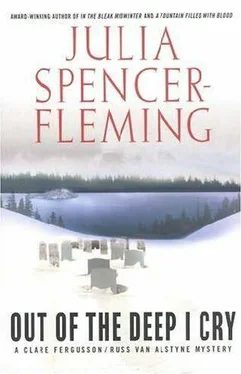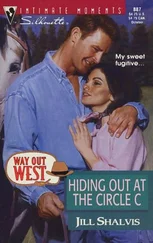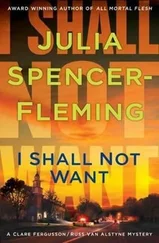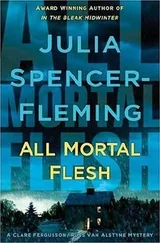“Well, if they don’t show, give the station a call and I’ll drive over and jump you.” There was a sort of strangled non-noise. “Jump your car. Jump-start it. The cruisers have incredible batteries.”
She started laughing. “Is that a Freudian slip, or are you just happy to see me?”
“Oh, Christ. Okay, now that I’ve made a complete ass of myself, I will get rolling.”
She smiled.
“You’re grinning at me, aren’t you? I can tell.”
She laughed. “Go on. Go keep the streets safe from the breakdown of traditional values.” She smiled again, and wondered if he could hear this one, too. “And keep yourself safe, too.”
“Always.” There was a pause, as if he were going to say something more, but then he said, “Bye.”
“Bye.”
She let the receiver slip out of her hand and dangle by its cord. Finally she stood to rehang it. There was a beep from her drive. She opened the kitchen door to see the AAA road-service truck. A skinny young guy bulked up like the Michelin tire man in insulated overalls climbed out of the cab.
“You called, lady?”
“You’re here sooner than I expected,” she said. Her voice carried through the bitter air.
“Yeah, well, the office tried to call you, but your line was busy.”
Allan Rouse, as it happened, lived several blocks down on the same street as Geoff and Karen Burns, in a brick Italianate not much different from theirs. Elm Street had been laid out for lawyers and doctors, mill owners and land speculators, from a time when those worthies had families of a half dozen children, and servants slept in low-eaved fourth-story bedrooms. The land speculators developed vacation condominiums instead of railroads now, and the mill owners had been replaced by two-career couples who commuted down to Albany, but the serenity of place and position remained. Clare was frequently exasperated by people who lived cocooned from the harshness of life in their various Elm Streets, but as she parked her Shelby and walked to the Rouse’s front door, she couldn’t help but admire the beauty of a neighborhood where every window gleamed, every historically accurate piece of door hardware shone, and the potholes were always filled in immediately.
The door opened. “Hello. You must be Reverend Fergusson.” The woman welcoming Clare was somewhere around sixty and holding, her body running to plumpness but not there yet, her hair still a determined glossy brown. “I’m Renee Rouse.”
Clare shook her hand and let the doctor’s wife take her coat. “I was admiring your house,” she said. “It’s lovely.”
“Thanks,” Mrs. Rouse said, opening a hall closet and hanging Clare’s coat inside. “It’s far too big for us now the children are grown, but we love it too much to leave. And the location is great. In nice weather, Allan likes to bike to work.”
He wasn’t biking anywhere today. In fact, when Clare caught sight of him after being ushered into the parlor, she wondered if he was ever biking anywhere again. He was sitting in a well-worn recliner that looked as if it had been his favorite chair for the past three decades. His whole body was clenched, furling in on itself, like that of an animal trying to enfold its soft underbelly within its tough outer hide.
Mrs. Marshall was perched on the edge of a sofa, leaning forward slightly. She glanced up when Renee Rouse led Clare into the living room, her relief and discomfort plain on her face.
“Oh, here you are, here’s Clare now, Allan.” Mrs. Marshall’s tone was the same one used by relatives at the bedside of a dying person-a kind of forced obliviousness to the graying reality beside them.
Mrs. Rouse crossed the plush carpet and knelt down by her husband’s side. “Sweetie?” she said. “Can I get you anything? How about some homemade hot chocolate? You know you love hot chocolate.”
Dr. Rouse closed his eyes for a moment. “Sure,” he said. “That’ll be fine.” He opened his eyes again. “Reverend Fergusson. Of course. You were the one who leaped in front of that Clow woman.”
There was a pause. Clare stood fixed to the carpet, wondering how she should respond. His greeting was hardly enthusiastic. She settled on a “Pleased to meet you,” and a wave.
“So, Clare,” Mrs. Marshall said, in a voice as bright as her fuchsia lipstick, “I’ve been telling Allan about the terrible situation with the roof, and how I’m going to be using the trust principal to help out the church.”
Clare looked for a seat that would require the least amount of movement from here to there. She picked a striped barrel chair kitty-corner to the sofa and balanced herself on its edge. If you’re feeling twitchy about a situation, “Hardball” Wright said, it’s because it’s a bad situation to be in. Unfortunately, she couldn’t just flop to her belly and elbow-crawl to the door, as her former survival school instructor would probably have advised. She had asked to be here. Furthermore, she was, if not directly culpable, at least one of the people responsible for Dr. Rouse’s ravaged expression.
They sat in a silence more full than speech. Mrs. Marshall glanced at Clare, then at Dr. Rouse. “Allan, since Reverend Fergusson is here, are there any questions you’d like to ask her?”
His eyes peered at her from a long way away. “Yes, I would,” he said, his voice rough and creaky. “I’d like to know how a priest gets to value bricks and mortar over human lives.”
“Oh, now, Allan, let’s not be melodramatic,” Mrs. Marshall said. “The ten thousand the clinic gets from the Ketchem Trust isn’t going to mean the difference between life and death. And I promise you, I’ll do everything I can to make sure the board of aldermen increases the town’s funding to the clinic to compensate.”
Clare thought Mrs. Marshall’s persuasiveness as an advocate for the clinic would take a hit, given the fact that she had withdrawn her own support. But she kept her mouth shut.
Mrs. Rouse returned with a tray bearing three brown-glazed mugs, the tall, slope-sided style unique to university gift shops and German beer halls. “I made some for everyone,” she said brightly. She gingerly set a mug on the table next to her husband’s chair, patted his shoulder several times, and then deposited the tray on the coffee table, within easy reach of her guests. “Honestly, Lacey, I don’t think we’re going to have to worry about replacing your contribution.” Renee Rouse dropped into a comfortable velveteen chair that sat kitty-corner to her husband’s. Books, magazines, and word-search puzzles were stacked on a broad stool at its side, and Clare could picture the Rouses, on long winter evenings, sharing the space together, reading. The Journal of the American Medical Association on his lap and the Ladies’ Home Journal on hers.
“The last two times there were changes in one of the revenue sources for the clinic, the town adjusted their share to compensate,” Mrs. Rouse went on. “As I recall, when that grant from the state ran out, they didn’t even wait for a regular session. They passed an amended budget at a special town meeting.”
Clare could feel the stone of guilt rolling away. “Really? That’s good to know.”
“If they do it again,” Dr. Rouse said. “If.” He lurched forward, his hands tightening on the arms of the recliner. “These are hard times! The board has been making noises about cutting down library hours and firing the high school art teacher to save money. Do you honestly think they’ll just hand it over to me and say, ‘Oh, here’s your ten thousand, Allan, and thanks so much for asking’?”
Mrs. Rouse recoiled.
The high color in Allan Rouse’s cheeks drained away. He shook his head. “I’m sorry, sweetheart. That was uncalled for.” He scooted to the edge of his chair and reached out a hand to her. “Please forgive me.”
Читать дальше












